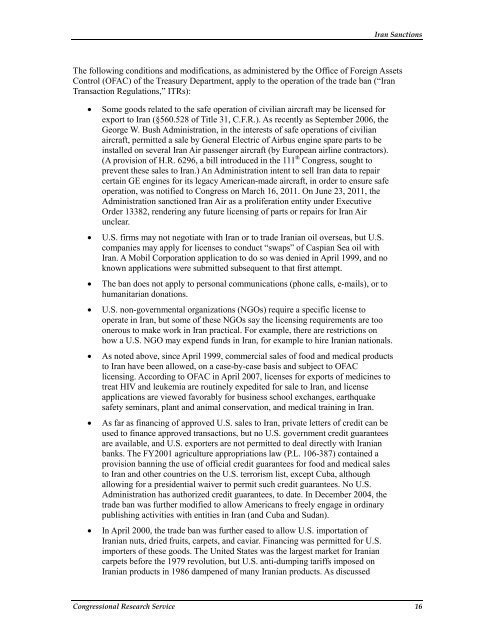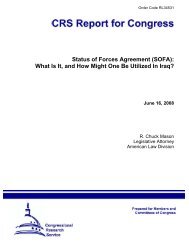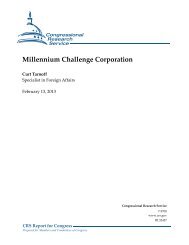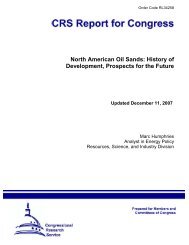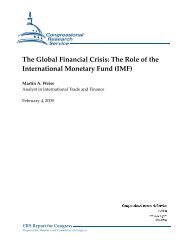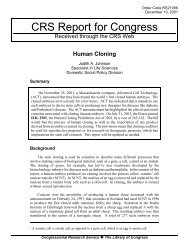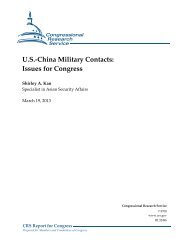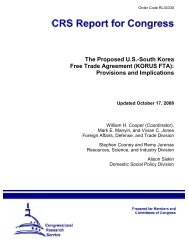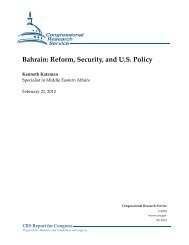Iran Sanctions - Foreign Press Centers
Iran Sanctions - Foreign Press Centers
Iran Sanctions - Foreign Press Centers
You also want an ePaper? Increase the reach of your titles
YUMPU automatically turns print PDFs into web optimized ePapers that Google loves.
<strong>Iran</strong> <strong>Sanctions</strong><br />
The following conditions and modifications, as administered by the Office of <strong>Foreign</strong> Assets<br />
Control (OFAC) of the Treasury Department, apply to the operation of the trade ban (“<strong>Iran</strong><br />
Transaction Regulations,” ITRs):<br />
• Some goods related to the safe operation of civilian aircraft may be licensed for<br />
export to <strong>Iran</strong> (§560.528 of Title 31, C.F.R.). As recently as September 2006, the<br />
George W. Bush Administration, in the interests of safe operations of civilian<br />
aircraft, permitted a sale by General Electric of Airbus engine spare parts to be<br />
installed on several <strong>Iran</strong> Air passenger aircraft (by European airline contractors).<br />
(A provision of H.R. 6296, a bill introduced in the 111 th Congress, sought to<br />
prevent these sales to <strong>Iran</strong>.) An Administration intent to sell <strong>Iran</strong> data to repair<br />
certain GE engines for its legacy American-made aircraft, in order to ensure safe<br />
operation, was notified to Congress on March 16, 2011. On June 23, 2011, the<br />
Administration sanctioned <strong>Iran</strong> Air as a proliferation entity under Executive<br />
Order 13382, rendering any future licensing of parts or repairs for <strong>Iran</strong> Air<br />
unclear.<br />
• U.S. firms may not negotiate with <strong>Iran</strong> or to trade <strong>Iran</strong>ian oil overseas, but U.S.<br />
companies may apply for licenses to conduct “swaps” of Caspian Sea oil with<br />
<strong>Iran</strong>. A Mobil Corporation application to do so was denied in April 1999, and no<br />
known applications were submitted subsequent to that first attempt.<br />
• The ban does not apply to personal communications (phone calls, e-mails), or to<br />
humanitarian donations.<br />
• U.S. non-governmental organizations (NGOs) require a specific license to<br />
operate in <strong>Iran</strong>, but some of these NGOs say the licensing requirements are too<br />
onerous to make work in <strong>Iran</strong> practical. For example, there are restrictions on<br />
how a U.S. NGO may expend funds in <strong>Iran</strong>, for example to hire <strong>Iran</strong>ian nationals.<br />
• As noted above, since April 1999, commercial sales of food and medical products<br />
to <strong>Iran</strong> have been allowed, on a case-by-case basis and subject to OFAC<br />
licensing. According to OFAC in April 2007, licenses for exports of medicines to<br />
treat HIV and leukemia are routinely expedited for sale to <strong>Iran</strong>, and license<br />
applications are viewed favorably for business school exchanges, earthquake<br />
safety seminars, plant and animal conservation, and medical training in <strong>Iran</strong>.<br />
• As far as financing of approved U.S. sales to <strong>Iran</strong>, private letters of credit can be<br />
used to finance approved transactions, but no U.S. government credit guarantees<br />
are available, and U.S. exporters are not permitted to deal directly with <strong>Iran</strong>ian<br />
banks. The FY2001 agriculture appropriations law (P.L. 106-387) contained a<br />
provision banning the use of official credit guarantees for food and medical sales<br />
to <strong>Iran</strong> and other countries on the U.S. terrorism list, except Cuba, although<br />
allowing for a presidential waiver to permit such credit guarantees. No U.S.<br />
Administration has authorized credit guarantees, to date. In December 2004, the<br />
trade ban was further modified to allow Americans to freely engage in ordinary<br />
publishing activities with entities in <strong>Iran</strong> (and Cuba and Sudan).<br />
• In April 2000, the trade ban was further eased to allow U.S. importation of<br />
<strong>Iran</strong>ian nuts, dried fruits, carpets, and caviar. Financing was permitted for U.S.<br />
importers of these goods. The United States was the largest market for <strong>Iran</strong>ian<br />
carpets before the 1979 revolution, but U.S. anti-dumping tariffs imposed on<br />
<strong>Iran</strong>ian products in 1986 dampened of many <strong>Iran</strong>ian products. As discussed<br />
Congressional Research Service 16


